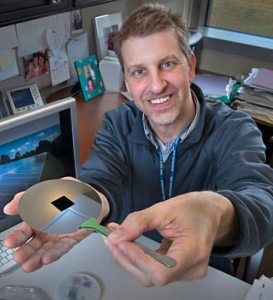Charles T. Black, a physicist developing new ways to engineer materials for energy applications at the U.S. Department of Energy's (DOE) Brookhaven National Laboratory, is being honored as an "Inventor of the Year" by Battelle—the global science and technology organization that, together with Stony Brook University, manages Brookhaven Lab through the company Brookhaven Science Associates.
The annual awards recognize individuals who have made significant scientific or engineering contributions with important societal or financial impacts. Black was honored at a celebration at Battelle's headquarters in Columbus, Ohio, on May 2.
 Brookhaven physicist Charles T. Black with one of his nanostructured surfaces
Brookhaven physicist Charles T. Black with one of his nanostructured surfaces
Black is being recognized for his work at Brookhaven's Center for Functional Nanomaterials (CFN), where he explores the use of nanostructured materials and self-assembly approaches in solar devices. The term "self assembly" describes the process by which individual objects can be made to spontaneously organize into regular patterns without human intervention. Black's goal is to direct and harness the tendency of certain materials to self organize into nanometer-scale patterns for improving the performance of solar cells.
"I'm excited and honored to be recognized by Battelle," said Black. "Scientific research has always been a creative outlet that lets me use my imagination. I enjoy exploring new ideas for finding solutions to challenging problems."
While working at IBM, Black pioneered using polymer self assembly to assist in fabricating high-performance semiconductor devices for microelectronics, a concept that today is moving rapidly toward commercial adoption.
Now, as Group Leader for Electronic Nanomaterials at the CFN, he continues to conduct seminal research on polymer self assembly—a nontraditional approach to designing materials with enhanced electronic and optical properties by controlling their internal structure at the nanoscale.
"I joined Brookhaven for the chance to apply nanotechnology approaches to society's energy challenge. The Center for Functional Nanomaterials is an excellent environment for this sort of research—full of talented scientists and state-of-the-art instrumentation for making and characterizing nanostructured materials."
Black has been instrumental in promoting invention and innovation at the CFN. Holding more than 40 U.S. patents combining his research careers at Brookhaven and IBM, Black's inventions include novel electronic devices and electrical contact designs, photovoltaic materials and structures, nanostructured surfaces exhibiting extreme water repellency and broadband antireflectivity, as well as unique tools that enable quantitative analysis of nanostructures.
Black earned a Ph.D. in physics from Harvard University in 1996, and began his career as a research staff member at the IBM Thomas J. Watson Research Center. In 2006, he joined Brookhaven as a scientist and group leader, managing the CFN's Electronic Nanomaterials Group. He has authored more than 100 scientific papers, and has been recognized with numerous awards for his innovative research contributions, including Industry Week Magazine's Technology of the Year Award in 2004, IBM's Outstanding Technical Achievement Award in 2005, and the 2004 World Technology Award for Information Technology Hardware. In 2010 he received a U.S. Department of Energy Outstanding Mentor Award. Black is a Fellow of the American Physical Society and a Senior Member of the Institute of Electrical and Electronics Engineers.
His work at the CFN is funded by the DOE Office of Science (BES).
DOE's Office of Science is the single largest supporter of basic research in the physical sciences in the United States, and is working to address some of the most pressing challenges of our time. For more information, please visit science.energy.gov.
The Center for Functional Nanomaterials at Brookhaven National Laboratory is one of the five DOE Nanoscale Science Research Centers (NSRCs), premier national user facilities for interdisciplinary research at the nanoscale. Together the NSRCs comprise a suite of complementary facilities that provide researchers with state-of-the-art capabilities to fabricate, process, characterize and model nanoscale materials, and constitute the largest infrastructure investment of the National Nanotechnology Initiative. The NSRCs are located at DOE's Argonne, Brookhaven, Lawrence Berkeley, Oak Ridge and Sandia and Los Alamos national laboratories.